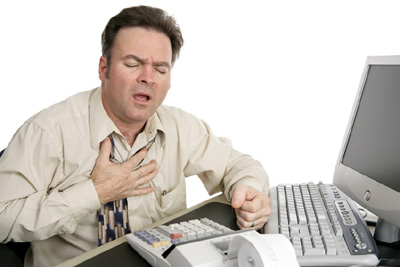When Heart Attack Occurs
- When you are resting or asleep
- After a sudden increase in physical activity
- When you are active outside in cold weather
- After sudden, severe emotional or physical stress, including an illness
Many risk factors may lead to the development of plaque buildup and a heart attack. 
What causes a heart attack?
Heart disease can lead to a heart attack when plaque builds up in the arteries that supply blood to the heart. If a blood clot forms, it can block blood flow to the heart. This causes a heart attack. Less often, a heart attack occurs due to a spasm in an artery that supplies blood to the heart.
What are risk factors for heart disease and heart attack that you can control? Not smoking is the best thing you can do for your heart. You can also lower your risk by staying at a healthy weight, eating a low-fat diet, and getting regular exercise (talk to your doctor before starting to exercise). Taking your medicine for high blood pressure and diabetes also lowers your risk.
Men are more at risk for heart attacks than women, but a woman's risk increases after menopause. African-Americans, Mexican-Americans, American Indians, Hawaiians, and some Asian-Americans have a higher risk for heart problems.

If your parents have heart disease, you are also at risk. Stress can add to your risk of heart disease. Some studies have found a link between stress and heart disease. How you deal with stress can also have an effect.
While some studies show that alcohol may have small heart benefits, it also increases the risk of alcoholism, high blood pressure, obesity, and breast cancer.
If you do drink, limit it to no more than one drink a day for women and two drinks a day for men. You can't miss signs of a heart attack.
Not everyone has the classic sign of a heart attack: sudden, intense chest pain. Chest pain may be mild or feel more like pressure or fullness. Not everyone has the same symptoms, so you should know all the signs of a heart attack. What are the warning signs of a heart attack?
While chest pain or discomfort is the most common symptom, symptoms can be less obvious, and you may not know what's going on. The more symptoms you have, the more likely you are having a heart attack.
Men and women can have all the same warning signs. However, women are more likely to have shortness of breath, back or jaw pain, nausea, or feel light-headed. These symptoms may occur without chest pressure or pain.
In women, heart attacks are more likely to occur in the years after menopause (usually, after the age of 50). However, younger men and women can also have heart attacks.
Heart attacks occur more often between 6 a.m. and noon, No one truly knows why, but studies suggest increased sympathetic nervous system tone and elevated cortisol levels during this time can lead to the rupture of cholesterol plaques in coronary arteries ultimately leading to a four fold higher risk of heart attack early in the morning.
|


